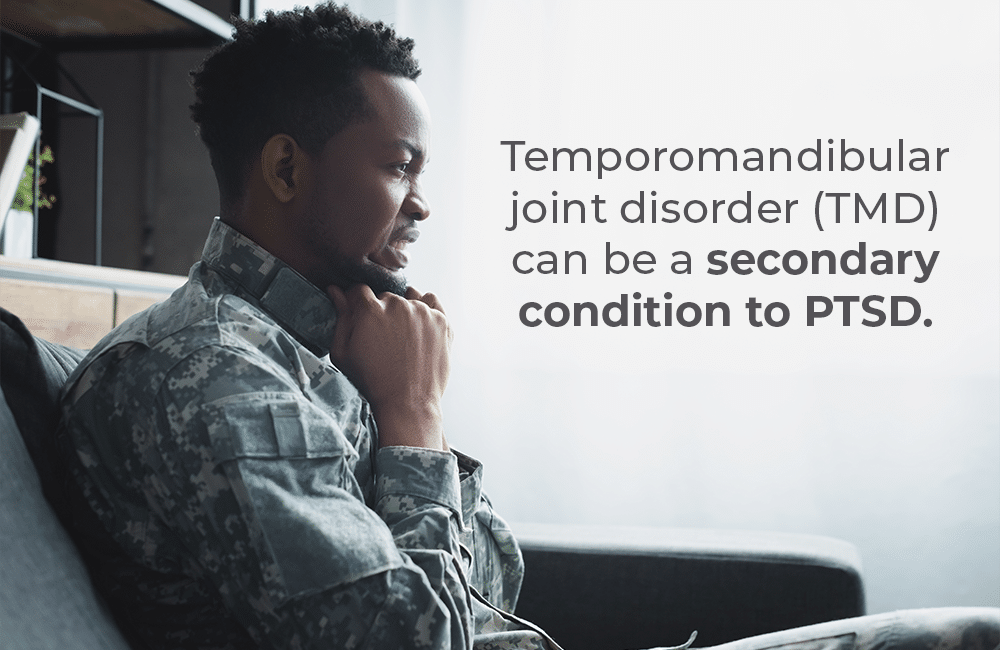Veterans living with temporomandibular joint disorder, or TMD, may be eligible for disability benefits through the U.S. Department of Veterans Affairs. TMD (commonly referred to as TMJ) can cause pain and discomfort, as well as dysfunction of the jaw bone.
What Is the TMJ VA Rating?
The VA rating for TMJ is 10%, 20%, 30%, 40% or 50%, based on 2 criteria: the degree to which a veteran has limited ability to open their mouth or move it side-to-side, and whether a veteran has to soften, chop, or blend their food to be able to eat due to TMJ Disorder.
Interincisal range: 0 to 10 millimeters (mm) of maximum unassisted vertical opening
With dietary restrictions to all mechanically altered foods – 50% rating
Without dietary restrictions to mechanically altered foods – 40% rating
Interincisal range: 11 to 20 mm of maximum unassisted vertical opening
With dietary restrictions to all mechanically altered foods – 40% rating
Without dietary restrictions to mechanically altered foods – 30% rating
Interincisal range: 21 to 29 mm of maximum unassisted vertical opening
With dietary restrictions to full liquid and pureed foods – 40% rating
With dietary restrictions to soft and semi-solid foods – 30% rating
Without dietary restrictions to mechanically altered foods – 20% rating
Interincisal range: 30 to 34 mm of maximum unassisted vertical opening
With dietary restrictions to full liquid and pureed foods – 30% rating
With dietary restrictions to soft and semi-solid foods – 20% rating
Without dietary restrictions to mechanically altered foods – 10% rating
Lateral excursion range of motion: 0 to 4 mm – 10% rating
The schedule of VA ratings refers to mechanically altered food as soft and semi-solid foods, pureed foods, and full liquid foods. Keep in mind that VA says “To warrant elevation based on mechanically altered foods, the use of texture-modified diets must be recorded or verified by a physician.” Please be sure to speak to your doctor and/or dentist about your TMJ, and discuss any difficulties with eating regular food. It is important to have your provider record such difficulties in your medical records.

VA’s Painful Motion principle says that if there is a pain in the movement of a joint then a veteran should receive a 10% rating, even if there is no functional loss or loss of range of motion. As TMD is defined as pain in the TMJ and/or its surrounding muscles, the veteran should be entitled to at least a 10% VA rating based on the Painful Motion principle.
Under this schedule of ratings, a veteran can receive up to a 50% rating. This means that they have 0 to 10 mm of maximum unassisted vertical opening with dietary restrictions to all mechanically altered foods.
Like all claims for service connection, VA will be looking for a diagnosis, as well as a connection between the diagnosis and the veteran’s active duty service (nexus). So, please consider talking to your doctor or dentist about getting a formal diagnosis if you do not already have one. A doctor or dentist will assess the movement of the jaw to identify any symptoms. However, an x-ray, CT scan, or MRI is typically necessary for diagnosis. These images will also be key pieces of evidence in your veterans disability case.
It is also important to note that TMD is considered a dental disability to the VA. VA offers any needed dental care for those with a service-connected dental disability or condition for which they receive compensation (i.e. a TMJ disorder rating of 10% or greater). Click here for more information about VA dental care.
Causes and Symptoms of TMJ Disorder
TMJ Disorder (TMD) is pain in the joint or in the muscles surrounding the Temporomandibular Joint. The TMJ is a complex joint because it has to allow for the opening and closing of the mouth, as well as the front-to-back and side-to-side motions associated with chewing. People who have this disorder may experience pain or hear a clicking sound when opening and/or closing their mouth, and/or have decreased mobility of the jaw. This can cause limitation of motion in the jaw opening.
Although it can be difficult to know exactly what causes this condition, trauma to the TMJ and stress are known risk factors.
Is PTSD Related to Temporomandibular Joint Disorder?
Post Traumatic Stress Disorder has been associated with numerous health conditions like heart disease and hypertension. However, there may also be a link between PTSD and TMJ Disorder.
A study comparing Iran and Iraq war veterans with and without PTSD to civilians with and without PTSD found that those with PTSD are more likely to have TMD than those without PTSD. These veterans are also more likely to have more severe symptoms of TMD. The study also found that war veterans had significantly poorer TMJ function, and higher rates of pain during palpation of the muscles surrounding the TMJ, than their counterparts who did not participate in war; this correlation was primarily linked to higher instances of trauma to the TMJ in war than in civilian life.

This may be because mental health conditions like PTSD increase stress levels, and stress may cause the veteran to clench their jaw more often. As mentioned above, tension in the jaw can lead to impairment of the TMJ, as well as significant pain. If you are service-connected for PTSD or sustained an injury to your TMJ in service, you may consider submitting a VA disability claim for TMD.
Post-traumatic stress disorder (PTSD) has been associated with numerous health problems, including cardiovascular disease, sleep apnea, and hypertension.
What Other Conditions Are Related to TMJ Disorder?
In addition to being a complex joint itself, the TMJ is located near other complex structures. Inflammation or trauma to the TMJ can result in complications with surrounding structures. One study found that tinnitus in people without hearing loss is a significant indication of undiagnosed TMD. Another study suggests that inflammation from TMD can press on the structures of the ear causing tinnitus and even hearing loss. TMD is also known to cause headaches, and neck pain.
Bruxism, which is the medical term for excessive teeth grinding or clenching, is often seen in those with TMD, as well as in those with PTSD. For VA purposes, bruxism can only be evaluated on a secondary basis as a symptom of another service-connected disability. Additional information about getting a VA rating for bruxism can be found here.
Get Help with Your VA Claim for TMJ Disorder
If you believe that your condition resulted from an in-serve incident but VA denied your claim for a TMJ disability rating, or gave you a lower rating than you deserve, contact our team to assess your situation. We can point you in the right direction or even help you appeal your VA claim. Contact us now for a free case evaluation.



